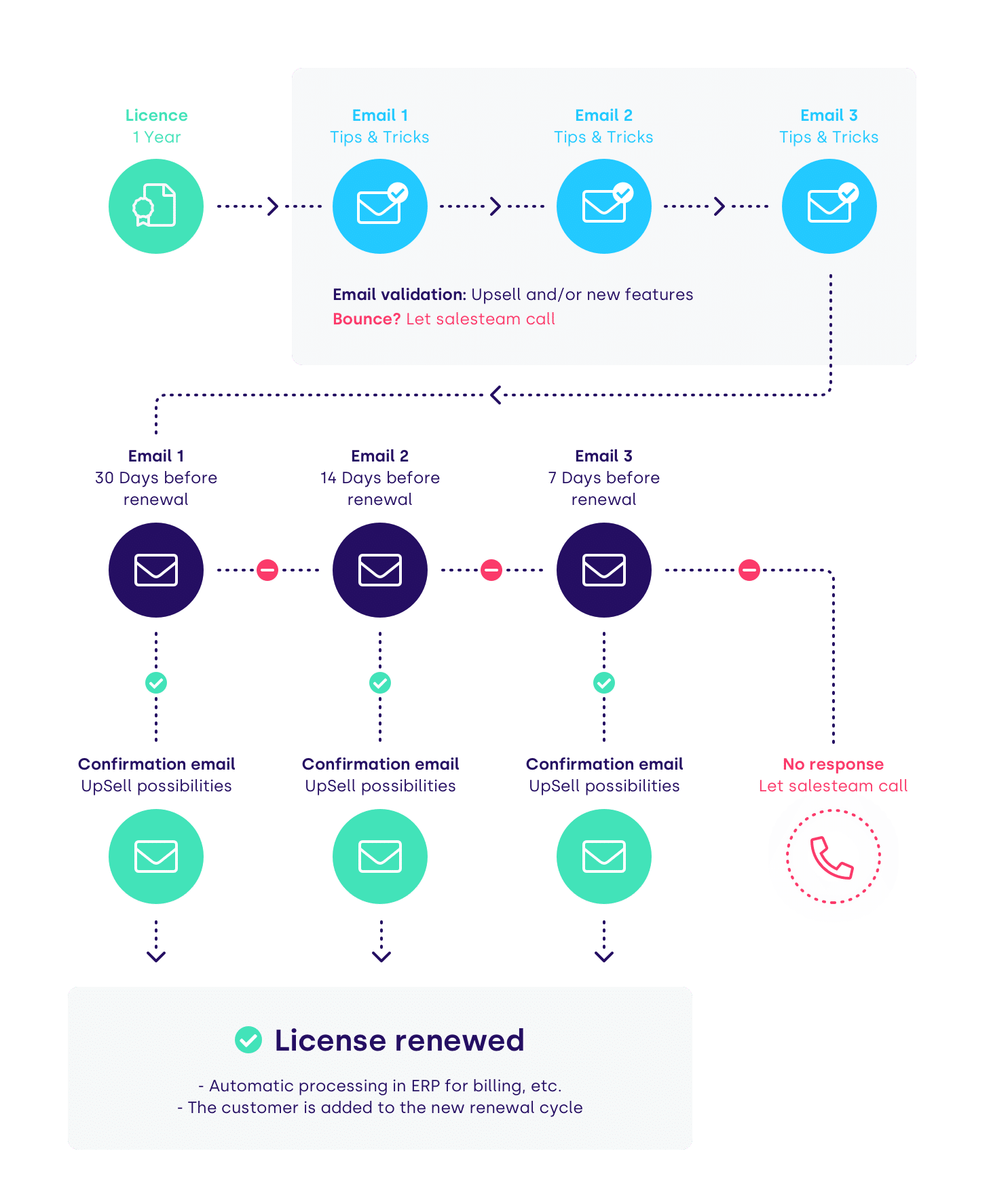Why email marketing?
Email marketing is and remains an important part of your marketing. This is certainly the case in B2B e-commerce. You can use it to build up a relationship with your prospects and customers, make relevant offers, and raise your conversion rate dramatically. Based on the reaction of the recipients, you can carry out follow-up steps, potentially automatically.
It is no secret that the inbox of your prospects and customers is a domain with many competitors. So, you need to stand out, be more relevant, and understand what motivates your target group. In doing so, selecting the right tools is extremely important.
Personalized emails have a 15% higher click-through rate.
A lot of digital commerce platforms have come into existence based on the B2C market. As a result, email marketing tools are limited to transactional emails. Propeller is based in the B2B market, in which lead generation and funnel management are extremely important. And this can be seen in the marketing automation that Propeller has, which is built-in as an integral module in the digital commerce platform.
But why is that important, what can you do with it, and what does it give you?
All data is present
CRM data
All your customer data is updated centrally. The email marketing module has direct access to all fields. If you are going to connect to an external system you will need to decide first which fields to link. Progressive insight is expensive because this will need to be developed. In an integrated solution, a CRM field that is added is automatically available for email marketing. If you don’t work at the source, you lose data.
Products
Logically, your products are in your commerce environment. If your email marketing is also located there, it is very easy to include your products in your mailing, to lead your customers quickly to your webshop again, from your email. This saves a lot of time in comparison with external email tools. In addition, this way you can’t get it wrong.
Order data
Email marketing packages are not transactional systems. So, they are not intended for recording history. This type of system can fill one row with fields for each contact person.
In the case of order data, that is very inconvenient. You want to be able to send messages automatically, based on specific order behavior.
An example:
A group of customers orders cartridges every month. Always the same, logically, and always with shipping costs. With an integrated email module, you can automatically recognize these customers, and make them a suitable offer for larger order quantities (saving them money and reducing the number of actions on your part). You can also consider including related products, popular items, etc.
With an external email package, this is not possible.
Browsing data
You want to be able to respond to specific browsing behavior in your webshop. Does a customer look at the same product several times, but make no order? Then send him an automated offer.
Because this information is present in your e-commerce platform, it is good that you can also take action in response to it. Other email marketing systems cannot process the history here either.
Realtime
Timing is everything. Whether you are talking about lead generation and following up on initial interest in your company or its products, or about conversion-raising communication, the moment when you react is extremely important. A lead is interested now; in half an hour they may not be interested anymore. In order to be able to respond to forms, requests for contact, and conversions, there must be no process-related impediments. A connection to an email marketing program will synchronize in batches, not in real-time. Leads won’t sit and wait for this.
So, what possibilities are created?
Personalization
In an integrated environment, you can personalize the customer experience in every imaginable way. Automatic messages based on demographic characteristics (geography, size of company, sector, function, etc.), based on order history (up and cross-sell, abandoned shopping cart, order value incentives, etc.), and based on browsing history (number of pages viewed, repeat visits to specific pages, etc.)
The big advantage of this is that you can be optimally relevant for the right person at the right moment. You help your customer with the best possible offer for the item that he has shown real interest in.
Segmentation
If your marketing automation is located in your e-commerce platform, you have access to every field. So, you can segment in a wide variety of ways. CEOs react to different arguments than purchasers. Align your message very precisely to every segment, for a higher conversion rate.
Trigger-based emails
You send automatic messages attuned to the behavior of your users. The right message at the right time, aligned to your user’s actions.
Imagine: You sell software licenses, lease contracts, or other products/services with an expiry date. You set up your renewal emails so that your customers are automatically encouraged in good time to extend their contracts which are about to expire. Those people who do not open or click on the first email automatically receive a reminder. The inside sales team only needs to focus on the segment of customers that have not yet extended. The extension is automatically processed and fulfilled by means of an integration with your ERP system. Very little work, no errors, nobody is overlooked high return.
Example of simple renewal flow

Scheduled emails
With the data that we collect, we automatically learn the ideal frequency for carefully tailored newsletters, special offers or drip campaigns. We know what interests our target groups (each individually) and we attune our campaigns to this. From that point in time onwards, everyone who satisfies the criteria will automatically receive these emails.
Cost savings
Besides the functional and conversion-raising benefits that we have already described, the costs are simply lower. If you integrate an external program into your e-commerce system you will spend time and have to make a significant investment in:
- Package selection
- Project definition; which fields are we going to integrate, which system takes precedence, and what technology are we going to use to realize the connection?
- Realization of the connection.
- License costs of the email marketing package
- Maintenance costs of the integration
- More efficient use of manpower; if a lot can be done automatically, and yet with great precision, then marketing personnel can make better use of their time.
Logically, your time-to-market is much less favorable than with an integrated solution. Added to this, you will need to learn how to use one or two packages.
Finally
Email marketing is no nice-to-have, but a must-have. When performed properly, it can make a significant contribution to your online turnover and it saves the cost of manual operations.
If your email marketing is integrated into your digital commerce platform, this will be reinforced exponentially. You have many more possibilities, can anticipate and respond directly, save costs and increase turnover. What’s not to like?





